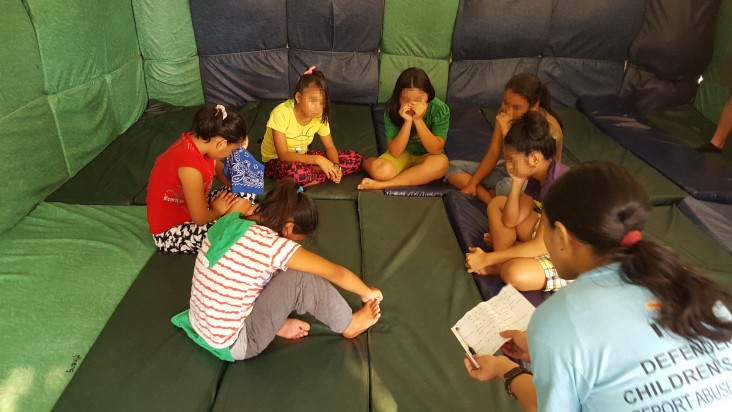
December 2016—Maria* was only 13 when she was trafficked. She now participates in group therapy in Zambales province, north of Manila, to help process her difficult experiences.
Maria, now 18, and other young survivors of trafficking reside in a shelter run by the People’s Recovery Empowerment and Development Assistance (PREDA) Foundation, one of USAID’s local partners combatting trafficking in the Philippines. The organization provides counseling and school scholarships to help children and teenagers overcome their trauma, expand their life skills and reintegrate into their communities.
PREDA also helps survivors who wish to seek justice from human traffickers. This is an optional—but important—part of the process. “Seeking and attaining justice is a requisite to genuine healing and recovery,” explains Francis Bermido, PREDA’s executive director.
Through the vigilance of local social workers, Maria was rescued from her captors and now resides in PREDA’s shelter, where she is rebuilding her life. With assistance from USAID and PREDA, Maria went back to school and will finish junior high this year.
“I began to value my life again and am looking forward to a better future,” says Maria. Expressing gratitude for her counselors and therapists, she adds, “It is through them that I came to realize my rights and dignity.”
In June 2016, Maria testified in court against her trafficker. Demonstrating tremendous courage, she told her story and stood her ground amidst questioning from the defense lawyer.
According to the U.S. Department of State’s 2016 Trafficking in Persons Report, trafficking of men, women and children is a significant challenge in the Philippines. Impoverished families, those in conflict-areas in Mindanao, and those from typhoon-stricken communities are subjected to domestic servitude, forced begging, forced labor in small factories, and sex trafficking in urbanized parts of the country. Trafficking also occurs in tourist destinations.
Women and children from remote areas are most vulnerable to sex trafficking and forced labor. Men are subjected to forced labor and debt bondage in the agricultural, fishing and maritime industries.
Children like Maria are often swayed because they are unaware of their rights or the realities of trafficking.
To help address this, USAID awarded a $440,000 grant to PREDA in 2014 to better detect and prosecute traffickers, increase awareness about trafficking, provide shelter and help survivors reintegrate into their communities. Since receiving the grant, PREDA has rescued 70 children.
USAID has funded five similar counter-trafficking organizations that have collectively assisted nearly 600 trafficking survivors, over half of whom are women and girls. The organizations operate in the country’s known trafficking hotspots. Their work aligns with the three pillars of the U.S. Government’s counter-trafficking strategy: prosecution, prevention and protection.
For example, one grantee provides free legal advice to help survivors pursue criminal and civil cases against traffickers. Another grantee organizes learning sessions with youth in at-risk communities to increase vigilance against trafficking and other gender-based violence.
These counter-trafficking grants are part of USAID’s Philippine American Fund, a $24 million grant-making facility that, since 2013, has been helping local Philippine organizations address the country’s development issues, including human trafficking, biodiversity and inclusive growth. USAID also helps grantees better manage and monitor their finances and performance so project benefits last long after USAID’s funding is complete.
*Full name withheld to protect identity.
LINKS
Follow @USAID_Manila, on Facebook, on Flickr, on YouTube







Comment
Make a general inquiry or suggest an improvement.